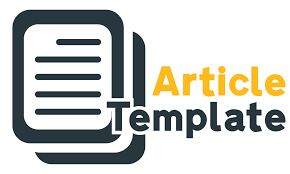THE TEACHERS’ ABILITY TO DEVELOP THE STEM-BASED SCIENCE LEARNING PLAN
Sari
Teks Lengkap:
Download PDF (hal 85-93) (English)Referensi
Afriana J, Permanasari A, dan Fitriani A (2016). Project Based Learning Integrated to STEM to Enhance Elementry School’s Students Scientific Literacy. Jurnal Pendidikan IPA. Indonesia. http://journal.uny.ac.id/indexphp/jipi. JPII 5 (2), p. 265-267.
Appianing, J. Eck, R.N.V. (2018). Development and Validation of the Value-Expectancy STEM Assessment Scale for Students in Higher Education. International Journal of STEM Education. 5 (24), p. 1-16
Chittum, J.R. Jones, B.D. Akalin, S. and Schram, A.B. (2017). The effects of an Afterschool STEM program on Students’ Motivation and engagement. International Journal of STEM Education. 4 (11). P. 1-16
Dare, E.A., Ellis, J.A., and Roehrig, G.H. (2018). Understanding Science Teachers’ Implementations of Integrated STEM Curricular Units Through a Phenomenological Multiple Case Study. International Journal of STEM Education. 5 (4), p. 2-19.
Deghaidy H E, Mansour N, Alzaghibi M, and Alhammad, K. (2016). Context of STEM Integration in Schools: Views from In-service Science Teachers. Eurasia Journal of Mathematics Science and Technology Education p. 2459-2474
Deghaidy H.E. and Mansour, N. (2015). Science Teachers’ Perceptions of STEM Education: Possibilities and Challenges. International Journal of Learning and Teaching. 1 (1). p. 51-54
Devi P K, Herliani E, Setiawan R, Yanuar, Y, and Karyana, S. (2018). Bimtek Pembelajaran Berbasis STEM Dalam Kurikulum 2013. Jakarta: Direktorat Pembinaan Sekolah Menengah Pertama, Kementerian Pendidikan dan Kebudayaan.
Fraenkel, J.R., Wallen, N.E. & Hyun, H.N. (2011). How to Design and Evaluate Research in education (eighth ed.) New York: Mc. Graw-Hill
Ismail, Permanasari, A., and Setiawan, W. (2016). STEM Virtuial Lab: An Alternative Practical Media to Enhance Student’s Scientific Literacy. Jurnal Pendidikan IPA Indonesia. 5 (2), p. 239-246.
Jolly, A. (2014). Characteristics of a Great STEM Lesson -Education Week Teacher. http://www.edweek.org/tm/articles/2014/06/17/ctq_jolly_stem.html.. p. 1-3
Kelly T R, Knowles J G, (2016). A Conceptual Framework for Integrated STEM Education. International Journal of STEM Education 20163: 11.http://doi.org/10.1186/s40594-016-0046-z
Khatri, R., Henderson, C., Cole, R., Froyd, J.E., Friedrichsen, D, and Stanford, C. (2017). Characteristics of Well-Propagated Teaching Innovations in Undergraduate STEM. International Journal of STEM Education. 4 (2), p. 1-13
Khoeroningtyas, N., Permanasarii, A. and Hamidah, I. (2016). STEM Learning in Material of Temperature and its Change to Improve Scientific Literacy of Junior High School Students. Jurnal Pendidikan IPA Indonesia.. 5 (1), p. 94-100.
Lehtamo, S. Jutti, K. Inkinen, J. and Lavonen, J. (2018). Connection between academic emotions in situ and retention in the physics track: Applying experience sampling method. International Journal of STEM Education. 5 (25). p. 1-6
Mustafa, N, Ismail, Z, Tasir, Z, and Said, M. N. (2015). A Metha- Analysis on Effective Strategies for Integrated STEM Education Advanced Science Letters Vol. 12 American Scientific Publishers. p. 4225-4229
Mutakinati, L. Anwari, I. and Yoshisuke, K. (2018). Analysis of Students’ Critical Thinking Skill of Middle School Through STEM Education Project- Based Learning. Jurnal Pendidikan IPA Indonesia, 7(1), 54-65.
Nagdi, M.E., Leammukda, F., and Roehrig, G. (2018). Developing Identities of STEM Teacher at EmergingSTEM Schools. International Journal of STEM Education. 5 (36), p. 1-3.
Ramli, N.F. and Talib, O. (2017). Can Education Institution Implement STEM? From Malaysian Teachers’ View. International Journal of Academic Research in Business and Social Sciences. 7 (3). P. 721-`732
Ritter, O.N. (2017), Book Riview: Philosophy of STEM Education- A Critical Investigation. Contemporary Education Technology. 8 (1). p. 99-102
Ritter, M.D. (2016). STEM for All Children: Preschool Teachers Supporting Engagement of Children with Special Needs in Physical Science Learning Centers. Young Exceptional Children XX (X) p 1-13
Robert, A. (2012 ). A Justification for STEM Education. Technology and Engineering Teacher. 74 (8), p. 111-118
Robert, A. Cantu, D. (2012). Applying STEM Instructional Strategies to Design and Technology Curriculum. Departement of STEM Education and Professional Studies. Old Dominion Uversitity, USA. p. 111-118
Robert, T. Jackson, Ch. Schroeder, M.J.M. Bush, S.B. Maiorca, C. Cavalcanti, M. Schroeder, D.C. Delaney, A. Putnam, L. and Cremeans, Ch. (2018). Students’ Perceptions of STEM Learning after Participating in a Summer Informal Learning Experience. International Journal of STEM Education. 5 (35). p. 1-16
Scott, C. An Investigation of Science, Technology, Engineering and Mathematics (STEM) Focused High Schools in the USA. Journal of STEM Education. 13 (5), p. 30-39.
Stohlmann, M. Moore, T.J. and Roehrig, G.H. (2012). Considerations for Teaching Integrated STEM Education. Journal of Pre-College Engineering Education Research (J-PEER). 2 (1). p. 27-34
Strimel, G. and Grubbs, M.E. (2016). Positioning Technology and Engineering Education as a Key Force in STEM Education. Journal of Technology Education. 2 (27). P. 21-36
Toto. (2018). STEM-Based Science Learning Design in the 2013 Curriculum. Yogyakarta: Proceeding on International Seminar- Universitas Negeri Yogyakarta.
Wang H, Moore T Roehrig G, and Park M, 2011 STEM Integration: Teacher Perceptions and Practice. Journal of Pre- College Engineering Education Research, 1 (2), p. 1-13
Wisudawati, A.W. (2018). Science Technology Engineering and Mathematics (STEM) Education Approach against a Microscopic Representation Skill in Atom and Molecule Concept. International Journal of Chemistry Education research. 2 (1). P. 1-5
Yildirim, B. (2018). Adapting the Teachers’ Efficacy and Attitudes towards STEM Scale into Turkish. Journal oof Turkish Science Education. 2 (15). P. 54-65
Refbacks
- Saat ini tidak ada refbacks.








